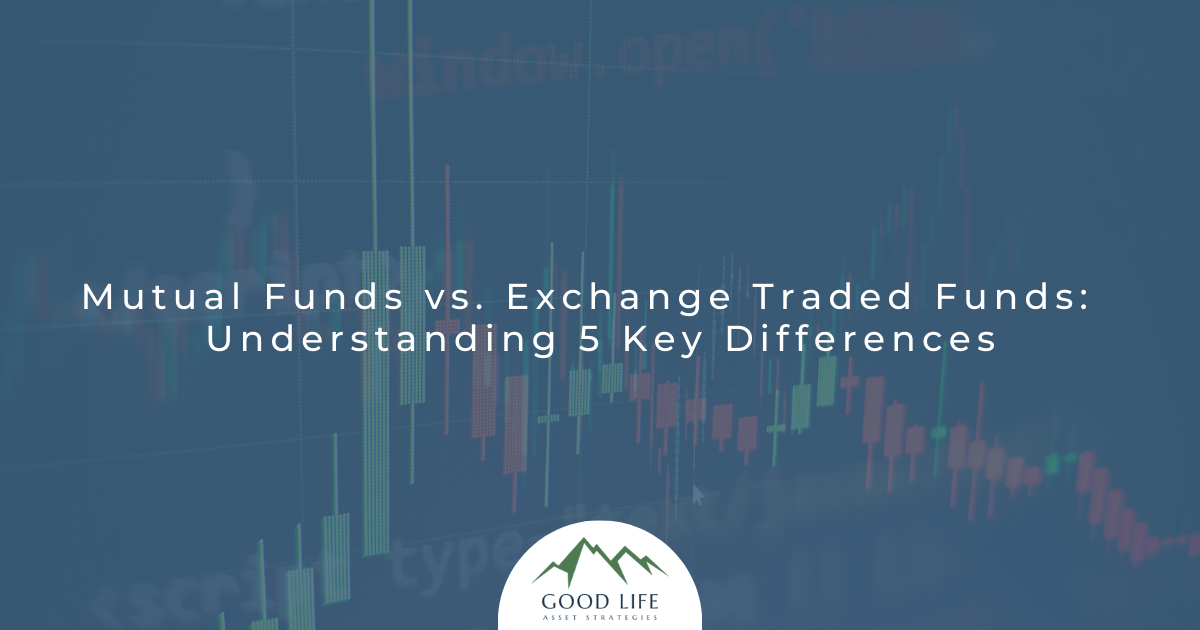- 817-864-8560
- justin@g-las.com
- Mon - Fri: 9:00am - 5:00pm

Sophisticated investors know the language of investment. It’s the lingo that matters, and you need to know and understand the language investment advisors and professional traders speak. Learning the language will help you think more like an astute investor.
Without further adieu, let’s dive into two of the most popular investing options: mutual funds and exchange-traded funds (ETFs). While both offer the opportunity to diversify and invest in a wide range of securities, there are five significant differences between the two types of funds.
Mutual funds are investment vehicles managed by professional fund managers. When you invest in a mutual fund, your money is pooled with that of other investors to create a larger fund. The fund manager then uses this pool of money to buy a diversified portfolio of securities such as stocks, bonds, and other assets.
ETFs are investment funds listed and traded on stock exchanges, similar to individual stocks. These products track a particular index, asset class, or sector. They are typically passively managed and aim to replicate the performance of the underlying index or assets they represent.
Mutual funds prices are set at the end of each trading day based on the fund’s net asset value (NAV). Investors can buy or sell mutual fund shares at the NAV price, regardless of the time of day they place their orders.
On the other hand, ETFs can be bought and sold throughout the trading day, just like individual stocks. Their prices fluctuate in real-time as they trade on the stock exchange. ETF prices give investors the flexibility to enter or exit positions at any time during market hours.
Expense ratios cover the costs associated with managing the fund. These expenses include management fees, administrative fees, and distribution costs. Beware of mutual funds that have fees associated with buying or selling shares. These are called sale charges or loads. We aren’t fond of this practice and encourage you to stay as far away from loaded mutual funds as possible.
ETFs generally have lower expense ratios, which is one of the reasons we prefer them in most cases. Their fees are lower because they are often passively managed and aim to replicate the performance of an index. ETFs don’t have sales loads, although investors may incur brokerage commissions when buying or selling ETF shares.
When the fund manager buys or sells securities within the fund, mutual funds can be subject to capital gains taxes. Shareholders may be responsible for paying taxes on these capital gains, even if they didn’t sell their fund shares. This structure can result in tax liabilities for investors, especially if the fund has a high turnover.
In contrast, ETFs structure in a way that generally makes them more tax-efficient. Due to their unique creation and redemption process, ETFs can minimize capital gains distributions, reducing tax liabilities for investors. Additionally, investors have more control over when they realize capital gains or losses when trading ETF shares.
Mutual funds offer a wide variety of investment options, including:
There are actively managed mutual funds where managers actively select securities to outperform the market.
ETFs also provide a diverse range of investment options, including:
Most ETFs are passively managed and aim to replicate the performance of a specific index or asset class. These funds are usually passively managed, but actively managed ETFs are also available.
If you want to participate in the stock market but don’t have the time, energy, or expertise to buy individual stocks, buying mutual funds or ETFs may be your way to go. Feel free to reach out for help in locating mutual funds, ETFs, or other investment management products. We’re here to analyze your unique financial situation and help you create a plan that best serves your interest. We’ll help you do your homework and ensure you understand the differences between the two vehicles and are aware of the costs and other considerations when owning them.
The views expressed represent the opinion of Good Life Asset Strategies, LLC. The views are subject to change and are not intended as a forecast or guarantee of future results. This material is for informational purposes only. It does not constitute investment advice and is not intended as an endorsement of any specific investment. Stated information is derived from proprietary and nonproprietary sources that have not been independently verified for accuracy or completeness.
Good Life Asset Strategies, LLC is a registered investment advisor located in Fort Worth, Texas. Good Life Asset Strategies, LLC and its representatives are in compliance with the current registration and notice filing requirements imposed upon registered investment advisors by those states within which the firm maintains clients.
All information herein has been prepared solely for informational purposes, and it is not an offer to buy or sell, or a solicitation of an offer to buy or sell any security or instrument or to participate in any particular trading strategy. Such an offer can only be made in the states that Good Life Asset Strategies, LLC is either registered or a notice filer or an exemption from registration is available under the securities laws or other laws.
Certified Financial Planner Board of Standards, Inc. (CFP Board) owns the CFP® certification mark, the CERTIFIED FINANCIAL PLANNER™ certification mark, and the CFP® certification mark (with plaque design) logo in the United States, which it authorizes use of by individuals who successfully complete CFP Board’s initial and ongoing certification requirements.